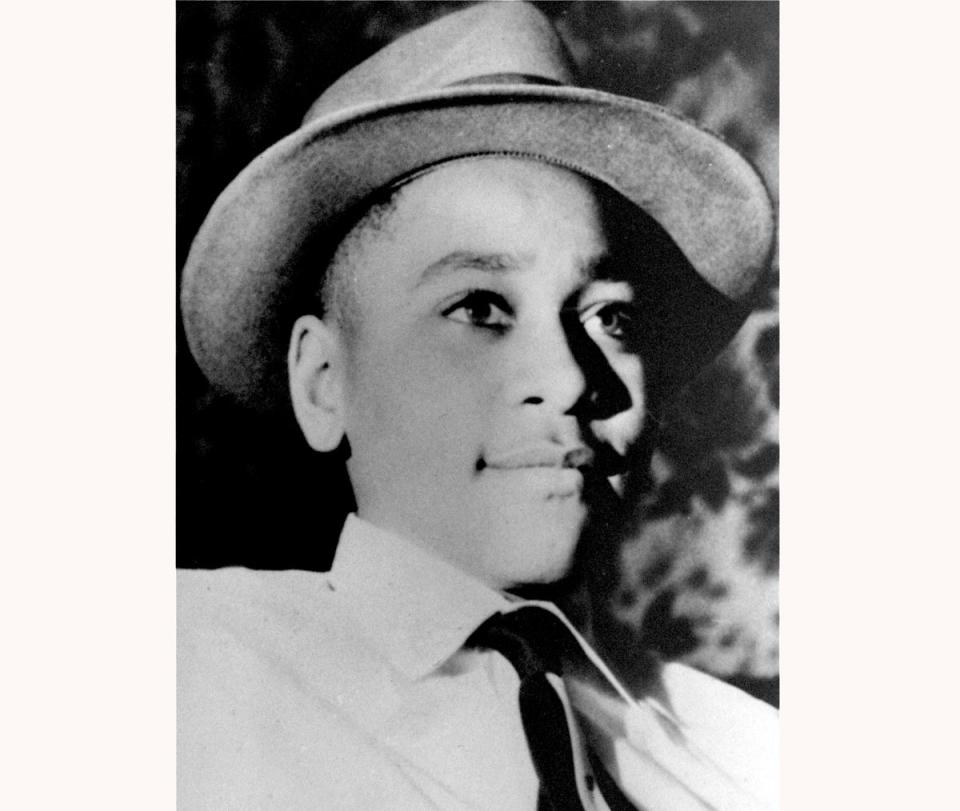‘Grief sits in the body. The body keeps score’: Danielle Deadwyler on playing the mother of Emmett Till and how the murder of Black people ‘has persisted’

For Danielle Deadwyler, it’s never been about the praise. At the time of our phone call, the 40-year-old actor was days away from receiving a Bafta nomination for her performance in Till and had already scooped Outstanding Lead Performance at the Gotham Awards in November. She is the lead in Chinonye Chukwu’s film about the true story of Emmett Till, a 14-year-old Black boy who was lynched by white men in Mississippi in 1955. His killing, and the uproar that resulted, is considered a catalyst for the American civil rights movement and is an integral part of the country’s modern history.
Deadwyler stars as Emmett’s mother, Mamie Till-Mobley, who was instrumental in ensuring that Emmett’s name would not be forgotten. Her portrayal of a heartbroken, furious, robbed mother, mourning the racist murder of her only child while campaigning for his justice, is one that is truly unforgettable. Her face is the first and last the audience sees, and throughout the film’s running time, it displays such a range of fierce emotions – joy during Mamie and Emmett’s (Jalyn Hall) car singalong sessions; apprehension when she waves him goodbye on his train ride down South; abject agony when she sees her son’s bloated, lifeless form for the first time.
That Deadwyler would receive high acclaim seems inevitable to anyone who watches Till. Her exclusion from the Oscars’ Best Actress nominations a week after our conversation is one of the biggest upsets of this year’s awards. The New Yorker critic Richard Brody wrote this week that she should have won the Oscar outright for a performance that “concentrates the character’s pain and fury into a visible power, which seems to fill the frame”. Yet when I ask about how she feels about the positive reception of the film and her contribution to it, she says that plaudits are low on the list of her feelings about the project. What matters most is sharing Mamie’s story.
“I don’t think about it as much,” she begins, “but I definitely know that any kind of awards’ consideration for me is a great opportunity to keep talking about Mamie – I’ll say it again and again. We’ll go wherever we are going, with regards to awards, but at the end of the day, Mamie didn’t want to be the only one talking about Emmett. And anything that comes my way is us further lauding and praising what she has done for this country.”
In August 1955, Chicago-born Emmett was visiting family in Mississippi for the summer, when one afternoon he had an encounter with white cashier Carolyn Bryant in a grocery store. Though the truth of what happened is unknown, Till was accused of flirting with, touching or whistling at Bryant, violating the Jim Crow segregation rules of the time. Some nights later, Bryant’s husband Roy and his half-brother JW Milam abducted Till from his relatives’ home. After mutilating and beating the teen, Bryant and Milam shot him and dumped his dead body in the river. Though the violence is never seen on screen, the pained, frightened cries of Emmett after the abduction are chilling.
Mamie Till-Mobley insisted that Emmett’s casket would be open at the funeral, so the world could have visual confirmation of the brutality that ended her son’s life. “I wanted the world to see what they did to my boy,” Till-Mobley said at the time. A photo of her and her then-fiance Eugene Mobley staring at Emmett’s corpse, his face battered to the point of near unrecognition, was published on the front cover of Jet magazine, and helped Emmett’s killing to become a national talking point.
Yet, an all-white jury cleared Bryant and Milam of Till’s murder the following month – and in 1956, both admitted that they’d tortured and murdered Till in a detailed magazine interview, as they knew they could never be tried again. Mamie Till-Mobley died in 2003, aged 81, 19 years before lynching was finally made a federal crime by president Joe Biden in the 2022 Emmett Till Antilynching Act.
Deadwyler, who was born and raised in Atlanta, grew up knowing all about Emmett Till, his story passed down through generations in the American South. Going into the project, she knew that it was going to be painful. As the mother of a 13-year-old-son herself, the actor was aware of how much of a toll playing Mamie would take on her. Saying yes wasn’t a decision she made lightly.

“I went about it in a very intentional manner,” she explains. “You don’t just burst out like, ‘Oh my God, yes, I want to do it!’ No, there’s a lot more consideration, thinking what will become of you as a result of this kind of visceral work. But there’s no other reason to do it but to continue to tell stories accurately, to tell stories with great authenticity. You want to be the person to honour the telling of this story as best as you can.”
And the after-effects were real. “You come out wounded,” she says. “You come out tired, deeply fatigued and exhausted. Because when you wake up and you go to work every day, there is someone else who was killed.” With the filming taking place in 2021, it was a year after the high-profile police killings of George Floyd, Ahmaud Arbery and Breonna Taylor, among others.
“Of course, it makes you consider Emmett, and the continuum of the loss of Black people along this American historical line. You can be so into the loss when it happens in the moment, but then there are moments where you sit and go, ‘Well damn it, this is persisting. This has persisted’.”

Deadwyler’s not new to using her art as part of the resistance. She is a multidisciplinary artist whose work in visual art, poetry and experimental film largely concerns Black womanhood and the labour that comes with it. After her mother saw her “dancing in front of the TV, looking at Soul Train”, Deadwyler was enrolled in dance classes by the time she was four. Trained in styles from ballet to hip-hop, the performer’s decades of dancing have informed how she works as an actor and as a performance artist.
All of these women I’ve played recently are just fighting for themselves, and their truth
“There’s a different kind of rigour that comes when you’re testing the body for hours on end, doing a performance piece,” she says. It surely took stamina, too, to play Mamie every day on set, sorrow and fury coming through in her every movement. The heaviness of the role meant that Deadwyler turned to a chiropractor, among other “personal, spiritual practices” to heal when the project wrapped. “Grief sits in the body – like that book says, the body keeps the score.”
Outside of Till, Deadwyler has shone in projects across several genres: she was a gang member in Netflix’s all-Black western The Harder They Fall, a brooding artist in the dystopian miniseries Station Eleven, and the nurturing sister of Zoe Saldana’s grieving lead in the teary romantic drama From Scratch. Her characters may vary, but something that attracts her every time is a woman who strives to make her experience heard.
“Toni Morrison talked about the presumption that oppressed people – people of colour, women – are on the margins. No, no, no,” she says. “We’re making ourselves the centre. All of these women I’ve played recently are just fighting for themselves, and their truth.”
Though Till isn’t easy viewing, Deadwyler wants everyone to give it their attention. The US is going through a period where Republican-backed campaigns seek to ban the teaching of critical race theory – an exploration of how social interactions, politics and media are affected by conceptions of race and ethnicity – in schools. As of 2021, several states, including Mississippi and Georgia, have introduced bills to restrict teaching about race, ethnicity or slavery in public schools. For Black viewers who may be particularly hesitant to engage with such tough subject matter, Mamie’s sentiment applies: the world needs to see what happened to her boy.
“I implore people – they have to look,” she says. “In a moment where we have so many folks, governmental representatives, who have great intentions to cast aside the truth of American history, we have to look. What would we rather do?” she asks. “Would we rather not, and allow them to continue to be the keeper of our history, or do we want to be the keepers of our history? It’s imperative that we are.”
‘Till’ is in cinemas


